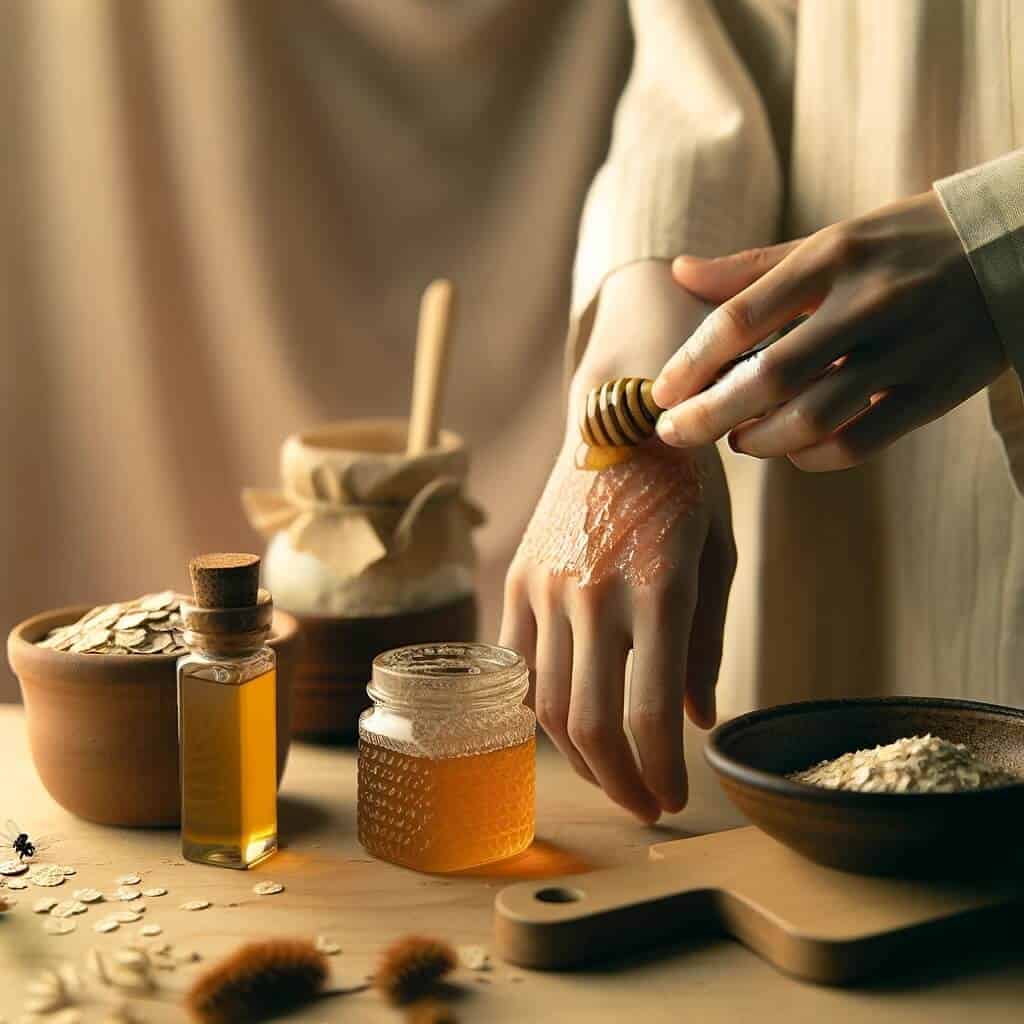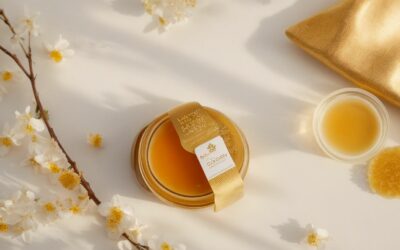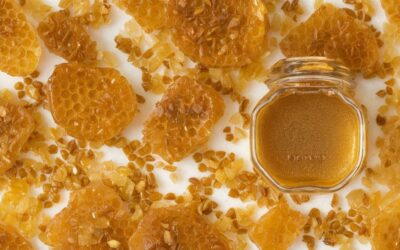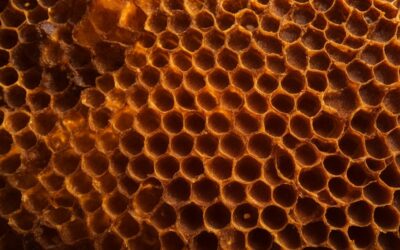Are you tired of dealing with the discomfort and frustration of eczema? Look no further, as this article explores the potential benefits of using manuka honey as a natural remedy for eczema.
Learn about the healing properties and potential uses of this unique honey variety, and discover how it may help alleviate your eczema symptoms.
Say goodbye to harsh chemicals and hello to a potential natural solution.
How Can Manuka Honey Help With Eczema?
For those who suffer from eczema, finding relief can be a constant struggle. One potential solution that has gained attention in recent years is manuka honey. But how does this sweet and sticky substance actually help with eczema?
In this section, we will explore the various ways in which manuka honey can aid in managing eczema symptoms. From soothing itching and inflammation to fighting bacteria and infections, manuka honey has a range of benefits for eczema-prone skin.
1. Soothes Itching and Inflammation
Manuka honey has been found to effectively soothe itching and inflammation associated with eczema. To incorporate Manuka honey into your eczema skincare routine, follow these steps:
- Make sure to use genuine, high-quality Manuka honey with a UMF (Unique Manuka Factor) rating.
- Gently cleanse the affected area with a mild, fragrance-free cleanser.
- Apply a thin layer of Manuka honey directly to the affected skin.
- Leave the honey on for approximately 20-30 minutes before rinsing it off with lukewarm water.
- Pat the skin dry and follow up with a moisturizer to lock in hydration.
- For best results, repeat this process 2-3 times a day.
By incorporating Manuka honey into your skincare routine, you can experience relief from itching and inflammation caused by eczema.
2. Moisturizes and Nourishes Skin
Moisturizing and nourishing the skin are key benefits of using Manuka honey for eczema. Here are some steps to effectively utilize Manuka honey for this purpose:
- Cleanse the affected area gently using a mild, fragrance-free cleanser.
- Apply a thin layer of Manuka honey directly to the eczema-affected skin to moisturize and nourish it.
- Leave the honey on for about 20 minutes to allow it to penetrate and provide moisture to the skin.
- Rinse off the honey with lukewarm water and pat the skin dry with a soft towel.
- Follow up with a gentle, hypoallergenic moisturizer to lock in the moisture provided by the honey.
- Repeat this routine twice a day, or as recommended by a healthcare professional.
3. Fights Bacteria and Infections
Manuka honey has strong antibacterial properties, making it an effective treatment for fighting bacteria and infections, including eczema. To utilize its benefits for eczema treatment, follow these steps:
- Apply Manuka honey topically to the affected areas.
- Leave it on for at least 20 minutes before rinsing off.
- Repeat this process twice a day for optimal results.
- For internal support, consume one tablespoon of Manuka honey daily.
- Make sure to choose a Manuka honey with a high Unique Manuka Factor (UMF) rating for maximum effectiveness.
- It is important to consult with a healthcare professional before using Manuka honey for eczema, especially if you have allergies or other medical conditions.
How To Use Manuka Honey For Eczema?
Manuka honey has been touted as a natural remedy for various skin conditions, including eczema. But how exactly can it be used to alleviate the symptoms of this common skin condition?
In this section, we will discuss two methods of using manuka honey for eczema: topical application and oral consumption.
By understanding the different ways in which manuka honey can be utilized, you can determine the best approach for incorporating it into your eczema treatment.
1. Topical Application
To apply Manuka honey topically for eczema, follow these steps:
- Cleanse the affected area with a gentle cleanser and pat it dry.
- Take a small amount of Manuka honey and apply it directly to the affected skin.
- Gently massage the honey into the skin using circular motions.
- Leave the honey on for at least 20 minutes or overnight for maximum benefit.
- Rinse off the honey with lukewarm water and pat the skin dry.
- Repeat the process twice daily or as needed until the eczema improves.
The antibacterial and anti-inflammatory properties of Manuka honey can help with topical application for eczema, soothing itching, reducing inflammation, and promoting healing of affected skin.
Remember to patch test before full application and consult a healthcare professional if you experience any adverse reactions.
2. Oral Consumption
Oral consumption of manuka honey can provide additional benefits for eczema treatment. Here are steps to incorporate manuka honey into your diet:
- Choose high-quality manuka honey with a Unique Manuka Factor (UMF) rating of 10 or higher.
- Start with a small amount, such as one teaspoon, to test for any allergic reactions.
- Consume manuka honey on an empty stomach for optimal absorption.
- Take it daily, either on its own or mixed with warm water, herbal tea, or lemon water.
- Gradually increase the dosage if no adverse effects are experienced.
- Monitor skin improvements and consult with a healthcare professional for personalized advice.
Are There Any Side Effects Of Using Manuka Honey For Eczema?
When utilizing Manuka honey for eczema, most individuals will not experience any significant side effects. However, some may have mild allergic reactions or skin irritation. It is important to perform a patch test before applying it to larger areas.
Additionally, caution should be taken by those with diabetes due to the high sugar content.
Overall, Manuka honey is generally considered safe for most people, but it is always recommended to consult with a healthcare professional if you have any concerns or pre-existing conditions.
Did you know that honey has been used for medicinal purposes for centuries? The ancient Egyptians used honey to treat wounds, while Ayurvedic medicine has long recognized its healing properties.
Even Hippocrates, the father of modern medicine, praised the therapeutic benefits of honey. Therefore, incorporating honey into skincare, including for eczema, is rooted in a longstanding tradition of natural remedies.
What Type Of Manuka Honey Is Best For Eczema?
To determine the most suitable type of Manuka honey for eczema, it is essential to take into account the following factors:
- UMF (Unique Manuka Factor) rating: Look for a UMF rating of 10+ or higher, as this indicates a higher level of antibacterial activity.
- MGO (Methylglyoxal) content: Higher levels of MGO suggest stronger antimicrobial properties.
- Raw and unfiltered: Opt for raw and unfiltered Manuka honey to ensure maximum potency and retention of beneficial enzymes.
- Certified: Choose a brand that is certified by reputable organizations, such as the UMF Honey Association, to guarantee authenticity and quality.
Consider these factors when selecting Manuka honey for eczema to maximize its potential benefits.
What Is The Recommended Dosage Of Manuka Honey For Eczema?
When using Manuka honey for eczema, it is important to follow the recommended dosage for optimal effectiveness and safety. The recommended amount of Manuka honey for eczema may vary depending on the severity of the condition and individual tolerance.
In general, it is recommended to start with a small dosage, such as half a teaspoon, and gradually increase it if there are no adverse reactions.
However, it is always best to consult with a healthcare professional or dermatologist for personalized advice and guidance.
It is important to remember that each person’s condition is unique, and what may work for one individual may not work for another.
Frequently Asked Questions
Is Manuka Honey Good For Eczema?
Yes, Manuka honey has been proven to be beneficial for eczema due to its anti-inflammatory and antibacterial properties. It can help soothe irritation and promote healing of the skin.
How does Manuka Honey help with Eczema?
Manuka honey contains a compound called methylglyoxal (MGO) which has strong anti-inflammatory and antibacterial properties. This helps to reduce inflammation and prevent infection, which are common issues in eczema.
Can Manuka Honey be used on all types of Eczema?
Yes, Manuka honey can be used on all types of eczema, including atopic, contact, and seborrheic eczema. It is safe and effective for both acute and chronic eczema.
How should Manuka Honey be used for Eczema?
Manuka honey can be applied topically directly onto the affected area or mixed with a carrier oil like coconut oil. It is recommended to leave it on for at least 20 minutes before rinsing off with warm water. It can also be consumed orally to benefit the skin from within.
Are there any potential side effects of using Manuka Honey for Eczema?
In general, Manuka honey is considered safe for use on the skin. However, some people may be allergic to honey, so it is important to do a patch test before using it on a larger area. Additionally, do not use Manuka honey if you are allergic to bee stings.
Where can I purchase high-quality Manuka Honey for Eczema?
Manuka honey can be purchased from health food stores, specialty honey shops, and online retailers. It is important to look for a reputable brand that clearly states the MGO level on the label, as this indicates the potency of the honey. Ideally, choose a Manuka honey with an MGO level of 400 or higher for maximum benefits.
I’m a Manuka honey enthusiast and creator of Manuka Honey Organic, a blog where I share my journey with authentic Manuka honey from New Zealand. I want everyone to learn about the healing powers of Manuka honey.





